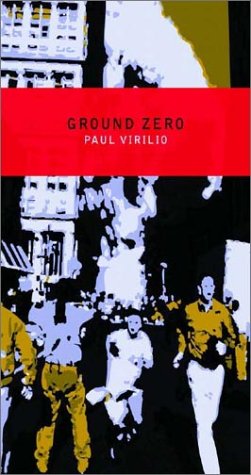THE TROUBLE WITH BEING BORN
Mon. June 21, 2004Categories: Abstract Dynamics

Does anyone understand Paul Virilio?
I’ve just read Ground Zero, a book which produced my usual response to Virilio’s texts. Individual sentences and even paragraphs make sense, but as a whole book, it just doesn’t add up. There’s no thesis, or at least no thesis that I am capable of detecting. Virilio butterfly leaps from Lenin to Big Brother to Fritz Lang to bio-ethics… Zizek does the same thing, but there’s always a readily-identifiable consistency glueing Zizek’s diverse concerns together. Not so with Virilio, whose ultimate preoccupations seem to be hermetically veiled. I always feel that there’s another text behind the one I’m reading, a text for initiates in which the fragmentary puzzle I’m confronted with is solved.
Art of the motor? Art of the non-sequitur more like…
Contrary to what its title implies, Ground Zero isn’t really about 9/11. Rather, it is a generalized complaint against – against what, exactly? Well, it seems to be a Procreationist assault against what he sees as contemporary culture’s Gnostic anti-natalism. Virilio’s catholicism is strongly in evidence in Ground Zero. He’s appalled, for instance, that a French court could award a disabled adolescent damages ‘for the harm of being born‘ whilst the same court ruled that ‘the unborn child is not a person.’
Beyond that, I can’t get much. Be interested in what others think.
I must say, though, I do heartily approve of these bite-sized theory books. Hmm, look at their shape – where could Verso have got the idea from?

I read about 5 pages of that book, then got bored. (The Baudrillard one was quite good, though. “The events strike is OFF!” Haha!! Magnifico!) Virilio’s style makes everything worse (or maybe it’s just the translators) – he’s a bit better when he’s talking. (Well, I liked “Pure War”, anyway). Maybe the fact that he’s a morbid, unlapsed Catholic helps make sense of his dismal tone. I should also say that, apart from the stuff regarding CNN (about which he knows something) ‘Desert Screen’ is truly appalling on the first Gulf War.
well, “accounts for” rather than “makes sense”
Virilio gives me a pain in the eye. Also, have you noticed, if you pick up a copy of the Face from 1982 or something, about half of the articles kick off with a Virlio quote.
what I mean about ‘Desert Screen’ is that his analysis about 24 hr News, “realtime” TV, and war is alright, is valid and everything – but the whole thing is sort of wonky and weak in a fundamental way, mainly because of his rather jumpy and jaundiced (oh God, I’m sorry about all this aliteration, and I’m sorry for wittering on and everything) (oh hell, now assonance as well) crushed-left crusty 68er “this is Vietnam but with nuclear bombs about to rain down” perspective on the whole job. It’s quite clear that he doesn’t follow the actual geopolitics THAT closely, and if he does, then his analytical skills fall short
oh, fuck it. I love Virilio. He’s a really great guy.
he’s a genius but a terrible writer. isolated sentences go off like bombs in your mind. but there’s never continuity from paragraph to paragraph, and often no continuity from sentence to sentence. the king of the nonsequitur as you say Mark. also (cf baudrillard) he fuckin CHURNS the stuff out, everytime i go to St Mark’s Bookstore (the east village equiv of Compendium – RIP — or ICA bookstore) there’s a whole tranche of new bitesize virilio and baudr books. i’m amazed there’s still a market for this stuff, given that it’s not exactly been hip for a good decade if not longer
Yeh, yeh, but does anyone know what he’s talking about? I genuinely don’t, 99% of the time. Baudrillard’s a whole different case; like Zizek, he repeats and reprocesses himself, but you always know what he’s talking abt and it’s always given new point… But, Virilio, I simply have no idea…
It’s best to always keep in mind that post structuralism is part of literary theory, and that the most famous proponants of it can’t write for toffee
Virilio is hardly a literary theorist! Mark, I think your trouble might be that expect him to be saying more than he actually is. As far as I can tell, there’s really not that much going on in Virilio: Speed and Politics, for example, has one idea, and it’s not a particularly good one. Most of the other stuff I’ve read is a lot worse. It all seems interesting in an off-kilter way at first, then you find out about the Catholicism and it makes a lot more sense, but you lose all sympathy.
i agree with the first poster…tried to read an article by Virilio once, got halfway through before deciding that life was way too short to read it…major yawnfest
he wrote something interesting on space once that i actually took notes from…i refuse to remember what, though, as a matter of principle 🙂
Simon’s right, I think, it’s best to use Virilio as a kind of epigramatically fragmentary assembly kit; Simon’s piece on picnolepsy and rave was the most brilliant use of Virilio I’ve seen, I reckon — but when you go back to read the stuff in The Aesthetics of Disappearance, it’s actually nowhere near as interesting as it looks out of context….
oh look, um, I’ve only read two books and five pages by him, one I liked, one and five pages I didn’t, so I don’t know why I even said anything! Bigmouth strikes again. I think I shall go and read the ‘Aesthetics of Disappearence’ and shut up. Like, who the fuck reads Virilio for “geopolitics”! (apart from idiots like Craner?)
I don’t know if I’d bother Oliver, really…
You should read ‘war & cinema’ – it makes perfect sense and has a definable thesis. All the others I’ve read are exactly as you describe.
I’ve read it. But beyond the idea that, hey, war, it’s a bit like cinema and hey, cinema, it’s a bit like war – well, once you’ve got that idea, there’s not much to it, is there?
Tried to read ‘Aesthetics of Disappearence’…never got past page 30. I mean, was he trying to say something??